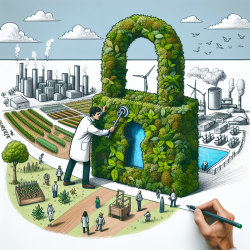In today's rapidly changing world, the need for sustainable practices has never been more critical. Whether you're a therapist, educator, or administrator, understanding and implementing sustainability principles can significantly impact your work and the communities you serve. Inspired by the research article "Defining Goals and Conditions for a Sustainable World" by J. Cairns Jr., this blog aims to provide insights into how practitioners can improve their skills and contribute to a sustainable future.
The Importance of a Shared Paradigm
The research highlights that sustainable development is often approached in fragmented ways—focusing on individual components like socioeconomic factors, agriculture, transportation, and energy use. However, achieving true sustainability requires a widely shared paradigm that integrates these components into a cohesive whole. As practitioners, it's essential to adopt an ecological perspective that considers the interconnectedness of various systems.
Why Shift from Growth to Sustainability?
The current paradigm suggests that economic growth is the solution to societal problems such as poverty, overpopulation, and environmental degradation. However, this approach often exacerbates these issues rather than resolving them. The research advocates for a paradigm shift towards sustainability, which could be achieved through proactive discussions about the ecosystems we wish to leave for future generations.
Implementing Sustainable Practices in Your Work
As a practitioner, you have the power to influence change within your sphere of influence. Here are some actionable steps you can take:
- Educate Yourself and Others: Stay informed about sustainable practices through conferences, webinars, and publications. Share this knowledge with colleagues and stakeholders.
- Integrate Sustainability into Planning: When developing programs or initiatives, consider their long-term environmental impact. Aim for solutions that benefit both people and the planet.
- Collaborate Across Disciplines: Work with professionals from various fields to develop holistic approaches that address multiple aspects of sustainability.
- Advocate for Policy Change: Use your voice to support policies that promote sustainability at local, national, and global levels.
- Engage with Communities: Encourage community involvement in sustainability efforts by organizing workshops or forums that foster dialogue and collaboration.
The Role of Research in Driving Change
The article emphasizes the importance of research in initiating discussions about sustainable futures. As practitioners, engaging with current research can inspire innovative solutions and guide evidence-based practices. Consider conducting your own research or collaborating with academic institutions to explore new sustainability strategies relevant to your field.
Conclusion
The journey toward a sustainable world requires collective effort and a willingness to embrace new paradigms. By integrating ecological perspectives into your practice and advocating for systemic change, you can contribute to creating a habitable planet for future generations.
To read the original research paper, please follow this link: Defining goals and conditions for a sustainable world.










